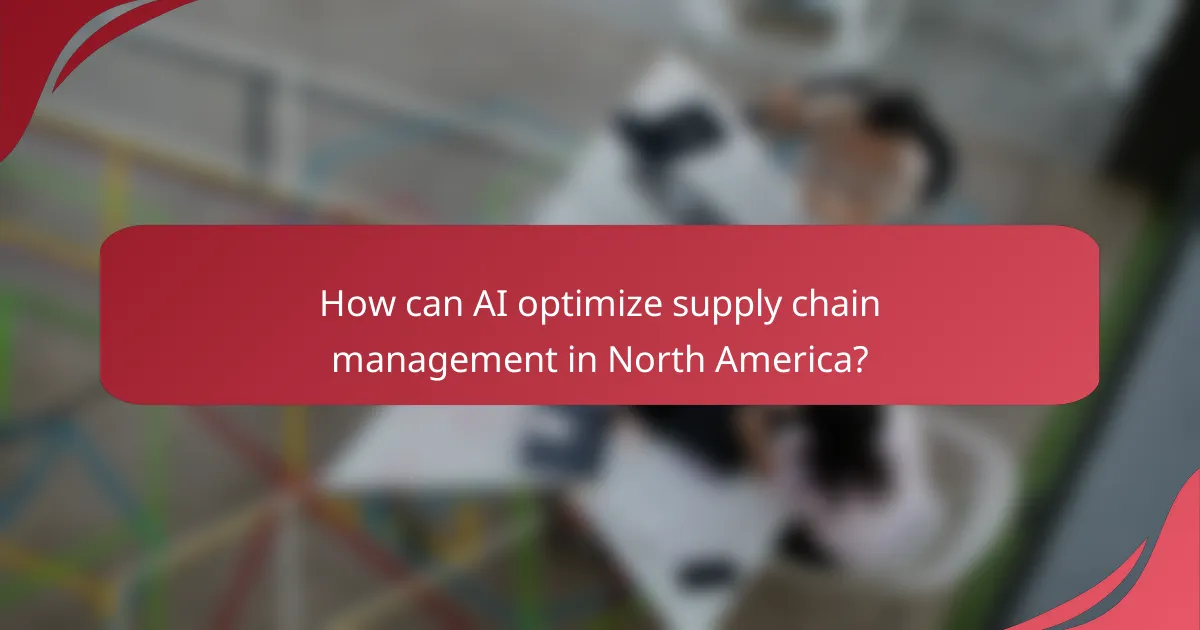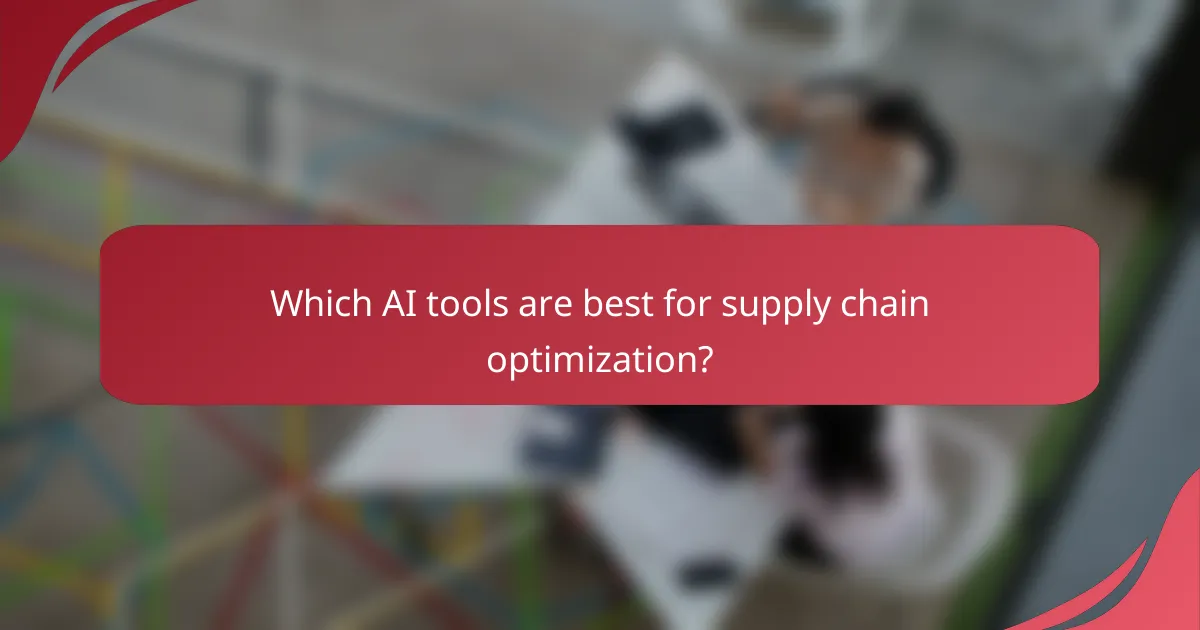AI-powered business solutions are transforming supply chain management and manufacturing by enhancing efficiency, reducing costs, and improving responsiveness. Through the use of data analytics and machine learning, companies can optimize operations, streamline processes, and make informed decisions that lead to better resource allocation and increased profitability.

How can AI optimize supply chain management in North America?
AI can significantly enhance supply chain management in North America by improving efficiency, reducing costs, and increasing responsiveness. By leveraging data analytics and machine learning, businesses can streamline operations and make informed decisions that lead to better resource allocation and customer satisfaction.
Real-time inventory tracking
Real-time inventory tracking utilizes AI to monitor stock levels continuously, providing businesses with up-to-date information on product availability. This technology helps prevent stockouts and overstock situations, which can lead to lost sales or increased holding costs.
Implementing RFID tags or IoT sensors can facilitate real-time tracking, allowing companies to automate inventory counts and receive alerts when stock levels drop below a certain threshold. This proactive approach ensures that businesses maintain optimal inventory levels, enhancing overall supply chain efficiency.
Predictive demand forecasting
Predictive demand forecasting employs AI algorithms to analyze historical sales data and market trends, enabling businesses to anticipate future demand. This capability allows companies to adjust their production schedules and inventory levels accordingly, minimizing waste and maximizing sales opportunities.
By incorporating external factors such as seasonality, economic indicators, and consumer behavior, businesses can refine their forecasts. Utilizing tools that provide insights into demand fluctuations can help ensure that supply meets customer needs without excessive surplus.
Automated order processing
Automated order processing streamlines the order fulfillment process by using AI to handle tasks such as order entry, invoicing, and shipment tracking. This reduces manual errors and speeds up the overall order cycle, enhancing customer satisfaction.
Integrating AI with existing Enterprise Resource Planning (ERP) systems can facilitate seamless order management. Businesses should ensure that their automation tools are user-friendly and compatible with their current systems to maximize efficiency.
Supplier risk assessment
AI-driven supplier risk assessment evaluates potential risks associated with suppliers by analyzing various data points, including financial stability, compliance records, and geopolitical factors. This proactive approach helps businesses identify vulnerabilities in their supply chain before they become critical issues.
Using machine learning models, companies can categorize suppliers based on risk levels and develop mitigation strategies accordingly. Regularly updating risk assessments ensures that businesses remain informed about their suppliers’ changing circumstances.
Route optimization
Route optimization leverages AI to determine the most efficient delivery routes, reducing transportation costs and improving delivery times. By analyzing traffic patterns, weather conditions, and delivery schedules, AI can suggest optimal routes that save time and fuel.
Businesses should consider using route optimization software that integrates with their logistics systems. Regularly reviewing and adjusting routes based on real-time data can lead to significant savings and enhanced customer service.

What are the benefits of AI in manufacturing efficiency?
AI significantly enhances manufacturing efficiency by optimizing processes, reducing waste, and improving overall productivity. By leveraging data analytics and machine learning, manufacturers can streamline operations and make informed decisions that lead to better outcomes.
Reduced production downtime
AI can minimize production downtime by predicting equipment failures before they occur. Predictive maintenance algorithms analyze data from machinery to identify potential issues, allowing for timely interventions that prevent costly halts in production.
For instance, manufacturers using AI-driven maintenance systems can reduce unplanned downtime by up to 30%, translating to substantial savings and improved output. Implementing regular monitoring and maintenance schedules based on AI insights ensures continuous operation.
Enhanced quality control
AI improves quality control by utilizing advanced image recognition and data analysis techniques to detect defects in real-time. Automated inspection systems can identify anomalies in products faster and more accurately than human inspectors.
By integrating AI into quality assurance processes, manufacturers can achieve defect rates as low as 1% or less, significantly enhancing product reliability. Regularly updating AI models with new data helps maintain high standards and adapt to changing production conditions.
Energy consumption reduction
AI contributes to energy consumption reduction by optimizing machinery operation and resource allocation. Smart systems can analyze energy usage patterns and suggest adjustments to minimize waste without compromising productivity.
For example, AI can help reduce energy costs by 10-20% through better scheduling of machinery and adjusting operational parameters based on real-time demand. Manufacturers should consider investing in AI solutions that monitor and optimize energy use across their facilities.
Improved workforce safety
AI enhances workforce safety by monitoring working conditions and identifying potential hazards. Machine learning algorithms can analyze data from sensors and cameras to detect unsafe behaviors or conditions, alerting workers and management in real-time.
Implementing AI-driven safety systems can lead to a significant reduction in workplace accidents, fostering a safer environment. Regular training on AI tools and safety protocols is essential to maximize their effectiveness and ensure employee engagement in safety practices.

How does AI contribute to cost reduction in e-commerce?
AI significantly reduces costs in e-commerce by streamlining operations, enhancing efficiency, and improving decision-making processes. By leveraging data analytics and automation, businesses can minimize expenses while maximizing profitability.
Lower operational costs
AI technologies can automate routine tasks such as inventory management, order processing, and customer service, leading to lower operational costs. For instance, chatbots can handle customer inquiries, reducing the need for large support teams. This automation can cut costs by a significant percentage, often in the range of 20-30% for certain operations.
Additionally, AI can optimize supply chain logistics, ensuring that resources are allocated efficiently. This reduces overhead costs associated with warehousing and transportation, allowing businesses to operate more leanly.
Minimized waste
AI helps in minimizing waste by predicting demand more accurately. By analyzing historical sales data and market trends, AI systems can forecast inventory needs, reducing excess stock and spoilage. This is particularly crucial for perishable goods in e-commerce.
Implementing AI-driven inventory management can lead to waste reduction of up to 30% in some sectors. Businesses should regularly review their AI models to ensure they adapt to changing market conditions.
Optimized pricing strategies
AI enables dynamic pricing strategies that adjust in real-time based on market demand, competitor pricing, and customer behavior. This flexibility can lead to increased sales and improved margins, as businesses can capitalize on peak demand periods.
For example, e-commerce platforms can use AI algorithms to analyze competitor prices and adjust their own accordingly, ensuring they remain competitive while maximizing revenue. Implementing such strategies can result in price optimization improvements of 10-15%.
Increased customer satisfaction
By utilizing AI, e-commerce businesses can enhance customer satisfaction through personalized experiences. AI analyzes customer data to provide tailored recommendations, improving the shopping experience and increasing conversion rates.
Furthermore, AI-driven customer support solutions can resolve issues quickly, leading to higher customer retention. Satisfied customers are more likely to return, which can significantly boost long-term profitability.

What criteria should businesses consider when implementing AI solutions?
Businesses should consider scalability, integration with existing systems, and the cost of implementation when adopting AI solutions. These factors will significantly influence the effectiveness and sustainability of AI technologies in enhancing operations.
Scalability of technology
Scalability refers to the ability of AI solutions to grow and adapt as business needs change. Companies should assess whether the technology can handle increased data volumes and user demands without compromising performance.
For example, a supply chain AI tool should efficiently manage operations as the business expands into new markets or product lines. Look for solutions that offer flexible pricing models based on usage or capacity, allowing for gradual investment as needs evolve.
Integration with existing systems
Successful AI implementation requires seamless integration with current systems and processes. Businesses should evaluate how well the AI solution can connect with existing software, databases, and workflows to avoid disruptions.
Consider solutions that provide APIs or pre-built connectors for popular platforms. A well-integrated AI tool can enhance data flow and improve decision-making without necessitating a complete overhaul of existing infrastructure.
Cost of implementation
The cost of implementing AI solutions can vary widely based on technology complexity and required customization. Businesses should budget for not only the initial investment but also ongoing maintenance and potential upgrades.
It’s advisable to conduct a cost-benefit analysis to ensure that the expected efficiency gains justify the expenses. Look for solutions that offer clear pricing structures, including any hidden costs associated with training or support services.

Which AI tools are best for supply chain optimization?
Top AI tools for supply chain optimization include IBM Watson Supply Chain and Microsoft Azure AI, both designed to enhance efficiency and reduce costs. These platforms leverage machine learning and data analytics to improve decision-making and streamline operations.
IBM Watson Supply Chain
IBM Watson Supply Chain utilizes AI to provide real-time insights into supply chain operations. It analyzes data from various sources to predict disruptions, optimize inventory levels, and improve demand forecasting.
Key features include advanced analytics, which can identify trends and anomalies, and a user-friendly dashboard that allows businesses to visualize their supply chain performance. Companies can expect to see improvements in efficiency by reducing excess inventory and minimizing stockouts.
To get started, businesses should integrate Watson with their existing systems and ensure data quality. Regularly reviewing analytics reports can help in making informed adjustments to supply chain strategies.
Microsoft Azure AI
Microsoft Azure AI offers a suite of tools for supply chain optimization, focusing on machine learning and predictive analytics. It helps businesses automate processes, forecast demand, and enhance logistics management.
Azure’s capabilities include customizable models that can be tailored to specific industry needs, as well as integration with other Microsoft services for a seamless experience. Companies can benefit from reduced operational costs and improved service levels by leveraging these tools.
When implementing Azure AI, businesses should prioritize training staff on the platform and continuously monitor performance metrics. This proactive approach can help in identifying areas for further optimization and ensuring alignment with business goals.


